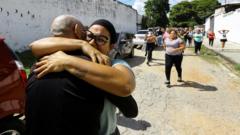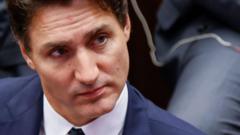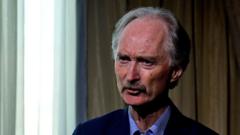Following the disputed election in July, rights group Foro Penal verified that 107 political prisoners were released, marking a significant moment in Venezuela's ongoing political strife.
**Venezuela Releases Over 100 Political Prisoners Post-Election Turmoil**

**Venezuela Releases Over 100 Political Prisoners Post-Election Turmoil**
Venezuelan authorities have freed more than 100 individuals arrested during post-election unrest amid widespread controversy surrounding President Maduro's victory claims.
Venezuelan authorities have recently released over 100 individuals detained after July's contentious presidential election, as reported by local human rights organization Foro Penal. Alfredo Romero from the NGO stated, "Up to now, we have verified 107 political prisoners... released in Venezuela," following significant unrest resulting from the election outcome.
The electoral body, aligned with President Nicolás Maduro, declared him the winner with 52% of the vote against opposition candidate Edmundo González's 43%. However, this result is plagued by accusations of manipulation; the opposition alleges that evidence exists showcasing González's victory by a larger margin. They even published what they claim to be detailed voting tallies contradicting official results, although the National Electoral Council (CNE) has cited hacking as the reason for their inability to verify these claims.
The aftermath of the election saw widespread protests, leading to a crackdown where over 1,800 people were arrested, facing charges such as terrorism and incitement to hatred. Footage shared on social media showed the released prisoners greeted by cheers from supporters, indicating a public yearning for political change.
Amidst these developments, the international community largely disputes the legitimacy of Maduro’s reelection as he prepares to start another six-year term in January. González, the opposition candidate, has since sought political asylum in Spain, furthering concerns for political dissidents in Venezuela as the country grapples with a complex socio-political landscape.
Adding to the tensions, recent reports indicated the arrest of five foreigners accused of plotting against the government, which the US has denied, dismissing claims of CIA involvement in a supposed assassination plot against Maduro. The situation remains fluid as Venezuela continues to navigate through profound political discord and human rights challenges.
The electoral body, aligned with President Nicolás Maduro, declared him the winner with 52% of the vote against opposition candidate Edmundo González's 43%. However, this result is plagued by accusations of manipulation; the opposition alleges that evidence exists showcasing González's victory by a larger margin. They even published what they claim to be detailed voting tallies contradicting official results, although the National Electoral Council (CNE) has cited hacking as the reason for their inability to verify these claims.
The aftermath of the election saw widespread protests, leading to a crackdown where over 1,800 people were arrested, facing charges such as terrorism and incitement to hatred. Footage shared on social media showed the released prisoners greeted by cheers from supporters, indicating a public yearning for political change.
Amidst these developments, the international community largely disputes the legitimacy of Maduro’s reelection as he prepares to start another six-year term in January. González, the opposition candidate, has since sought political asylum in Spain, furthering concerns for political dissidents in Venezuela as the country grapples with a complex socio-political landscape.
Adding to the tensions, recent reports indicated the arrest of five foreigners accused of plotting against the government, which the US has denied, dismissing claims of CIA involvement in a supposed assassination plot against Maduro. The situation remains fluid as Venezuela continues to navigate through profound political discord and human rights challenges.



















